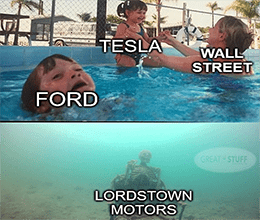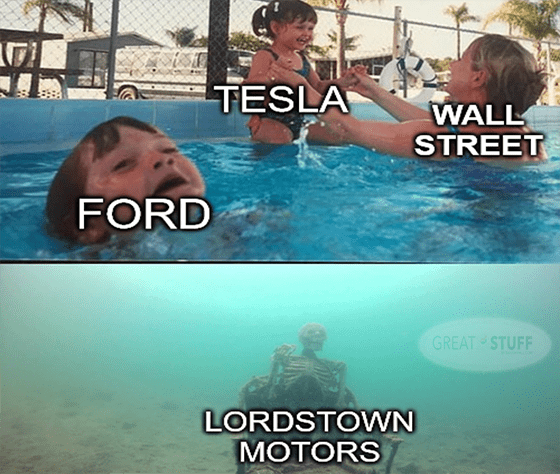Lordstown, You Wreck Me Baby
Great Ones, somewhere, somehow, somebody must have kicked you around some.
Tell me why you want to lay there invested in Lordstown Motors (Nasdaq: RIDE). It don’t really matter to me, Great Ones. Everybody’s had to fight to be free. But you don’t … have … to invest like a refugee. (Don’t have to invest like a refugee.)
I know it’s a stretch, but I hadn’t hit up the late, great Tom Petty in a while. And I felt it was time.
So, Lordstown Motors … the electric vehicle (EV) manufacturer that promised to bring the first EV truck to market. They were running down a dream and learning to fly … until this morning, when they were almost knocked back to square one.
Lordstown released its first-quarter report this morning, and I have to say, I’ve rarely seen a bigger breakdown.
The company lost $0.72 per share on the quarter versus expectations for a loss of $0.28. There’s no revenue … because Lordstown doesn’t have actual products yet.
What’s more, the company said that it ripped through $43 million in cash during the first quarter, leaving it with about $587 million on hand.
But even the losers get lucky sometimes, right?
This is not one of those times. Lordstown also slashed its production outlook: “Expected Endurance production in 2021 will be limited and would at best be 50% of our prior expectations.”
If you remember back during Lordstown’s fourth-quarter conference call — and who doesn’t? — the company projected Endurance EV truck production would reach 60,000 units by the end of 2021. Doing a little back-of-the-envelope math, that means Lordstown is now looking at production of just 30,000 Endurance trucks this year. Assuming it can get the funding, that is.
During the report, Lordstown said it was looking for more cash to fund development and production. That could mean the sale of more RIDE shares, which would dilute existing shareholders, leaving them singing: “Don’t do me like that!”
I’d wager that’s probably the biggest reason why RIDE fell more than 15% today, but wait … there’s more!
Proving that waiting really is the hardest part, Lordstown’s production delays could give both Tesla and Ford the first-mover advantage that Lordstown originally bragged about — nay, promised! Both the Ford F-150 Lightning Pro and Tesla’s Cybertruck are slated to hit the streets in the first quarter of 2022.
In other words, Lordstown’s Endurance might not be the first EV truck to reach the market.
And if that wasn’t enough, the Endurance will reportedly sell for $52,500 — just above the F-150 Lightning at $47,500 and well above the Cybertruck at $39,900.
While I certainly don’t know how it feels to be an EV manufacturer right now — what with soaring steel prices and a massive semiconductor shortage — I honestly can’t see an American girl riding around in a $52,500 electric pickup.
Yes, Great Ones, I’m going to listen to my heart and avoid Lordstown until it gets itself straightened out. For everyone else … it’s time to move on, time to get going. Finding the right EV play for you is one of those things you gotta feel to be true.
What nobody is talking about is the real EV profit story. It’s under the hood — in the technology making it possible. And no, I’m NOT talking about the lithium battery.
Click here to learn more ASAP.
Going: Buy Another Day
Last week, Great Stuff brought you news that Amazon (Nasdaq: AMZN) was in talks to buy one of the three remaining “minor” movie houses: MGM Studios.
At the time, the acquisition was still just a rumor. After all, almost everyone has tried to buy MGM Studios in the past year, including Apple (Nasdaq: AAPL). But The Wall Street Journal confirmed on Monday that a deal could arrive as soon as today.
The price tag? Between $8.5 billion and $9 billion.
If true, that’s quite a steal for Amazon. MGM Studios owns several seriously popular series and franchises, including The Handmaid’s Tale, Rocky, James Bond, Shark Tank, Survivor and The Voice.
MGM also owns Epix, a premium pay-TV service that could go a long way to revamping Amazon Prime Video’s own pay-per-play offerings.
For Amazon, acquiring MGM Studios would be its biggest purchase since Whole Foods, which it snapped up for $13.7 billion back in 2017. That alone should tell you just how valuable MGM’s catalog is to the success of Amazon Prime Video.
It’s not quite a Disney-level acquisition, but it’s really close.
Editor’s Note: Trading Just Got A Whole Lot Simpler
To most people, the stock market is overwhelming. There are so many stocks to choose from, most people don’t know where to start So, they never do…
Fortunately, there’s a way to simplify everything — a way that cuts to the stock market’s very core. Click here to see what it is.
Going: Martha, Martha, Martha
I read the pot stock news today — oh boy.
About lucky Canopy Growth’s (Nasdaq: CGC) new upgrade. And though the news was rather bullish, well, I just had to laugh.
MKM Partners upgraded the stock from neutral to buy — since the floor’s basically fallen out on pot stocks, CGC’s risk/reward scenario looks appealing enough to bite.
It’s the first breath of fresh, dank air Canopy has had in quite some time — at least as far as the Street is concerned.
No one seemed to care about last week’s news that Canopy brought Martha Stewart on board as a brand ambassador and official strategic adviser — glamorous!
Speaking as the official brand ambassador of Great Stuff … I’m personally interested in seeing what Martha Stewart brings to Canopy (take that how you like). The company’s alluded that Stewart would have a hand in product development and strategic partnerships, which could up the clout and hype surrounding the company.
But as far as MKM’s argument goes about pulling the trigger on CGC … I’m going to puff, puff pass on that one. I’m still leery of pots stocks as a whole due to lack of movement on U.S. legalization. That needs to happen before any of these stocks will truly take off on anything other than consolidation news.
But I get it — some of y’all are much more gung ho about risky pot stocks, and that’s OK. If you were looking to take a risk and buy into CGC anticipating U.S. legalization, now would be a good time.
The stock is bouncing off technical support near $22, which has been a floor and a ceiling for CGC in the past. It should hold firm for the shares going forward … barring any bad news out of Washington.
If you’re buying in now, look to take profits or be wary should CGC head near $30. There’s some serious resistance there that might only be overcome by positive movement on the legalization front. Surprise, Martha Stewart ain’t your savior, Canopy. Legislation is.
Gone: Post-Moderna Art
The perennial runner-up in the vaccine race, Moderna (Nasdaq: MRNA) finally completed trials for its COVID-19 vaccine for teens — just three weeks after Pfizer (NYSE: PFE) beat it to the pfunch.
Moderna announced that its two-dose vaccine is 100% effective in kids between 12 and 17 — and 93% effective after just the first dose.
The vax-maker plans to hit up the FDA to expand its emergency use approval, ideally to start vaccinating teens early next month.
What’s more, the company just yesterday expanded its partnership with Aldevron, a genetic medicine manufacturer. This should help up the company’s output at a crucial time for the global vaccine rollout to further take hold.
But … but, this is all good news! Think of the children! Why is Moderna “Gone” today?
Frankly, I’m as happy as anyone else to hear kids can get their 5G upgraded — er, vaxxed up before the next school year starts. You know how middle schoolers can be with hygiene… A safe, healthy and otherwise normal-boring school year sounds perfect to me after the absolute mess this year was.
But as far as Wall Street is concerned? Meh. Best I can give you is a 2% rally. Pfizer was first; Pfizer did it better.
Sure, but just wait until Moderna is likewise literally printing money once vaccine revenue starts to roll in — then investors will rave about MRNA again. But who knows? Maybe we’ll all be too hopped up on Martha Stewart’s branded greatness to care by then.
Apple’s antitrust spat with App Store developers has turned into a war of Epic proportions. And as the trial winds down, things are looking bleaker for Apple — at least if the courtroom hot takes are anything to go by.
Contrary to what Tim Cook & Co. probably hoped, Judge Yvonne Gonzalez Rogers was rather interested in Apple skimming profit off the top of every transaction through its store. Remember, this isn’t just paying for apps … but any in-app payments too. Rather unfair, huh? That’s … why we’re here.
Apple’s typical “woe is me” theatrics and willful ignorance were no help. Judge Gonzalez Rogers homed right in on the ludicrous 70%-30% revenue split that Epic Games and hordes of other developers are justifiably furious over.
Apparently, you Great Ones aren’t the only ones thinking that Apple does nothing to earn its extra vig. Straight from the judge:
Tim Cook didn’t do himself any favors in court either. You know how Apple’s main cash cows now are its services and App Store revenues? Yeah, somehow Tim Cook “wasn’t sure” how high its App Store profit margins actually are.
OK, in Cook’s defense, “I’m not sure” might not be an outright lie — he’s just missing the “but it’s gotta be a helluva lot by now” part afterward. Though, at least the Apple CEO acknowledged that the majority of its App Store revenue comes from in-app purchases — the very same payments that Epic argues are unfairly split.
And if that payment revenue was fairly split, says Judge Gonzalez Rogers, why are 39% of developers unsatisfied with Apple’s distribution services? Here she stings again:
Apple? Address anyone’s needs? Please.
Apple’s walled-garden approach addresses Apple’s needs — keeping you in a closed-off system that keeps your money going straight to the Apple core.
Now, how do you feel about Apple’s hot-and-heavy case, Great Ones? Will this be the antitrust straw that breaks the Apple’s back? Or will Apple’s walled garden survive its Epic onslaught? Let me know in the inbox!
Whatever you feel like sharing — market-related or otherwise — drop us a line at GreatStuffToday@BanyanHill.com.
In the meantime, here’s where else you can find us:
- Get Stuff: Subscribe to Great Stuff right here!
- Our Socials: Facebook, Twitter and Instagram.
- Where We Live: GreatStuffToday.com.
- Our Inbox: GreatStuffToday@BanyanHill.com.
Until next time, stay Great!
Joseph Hargett
Editor, Great Stuff

